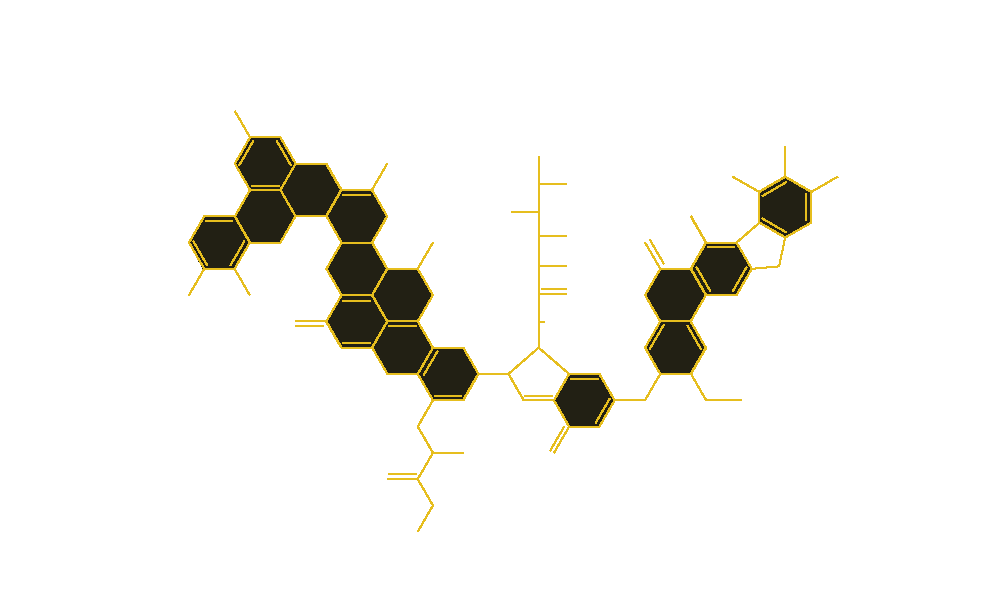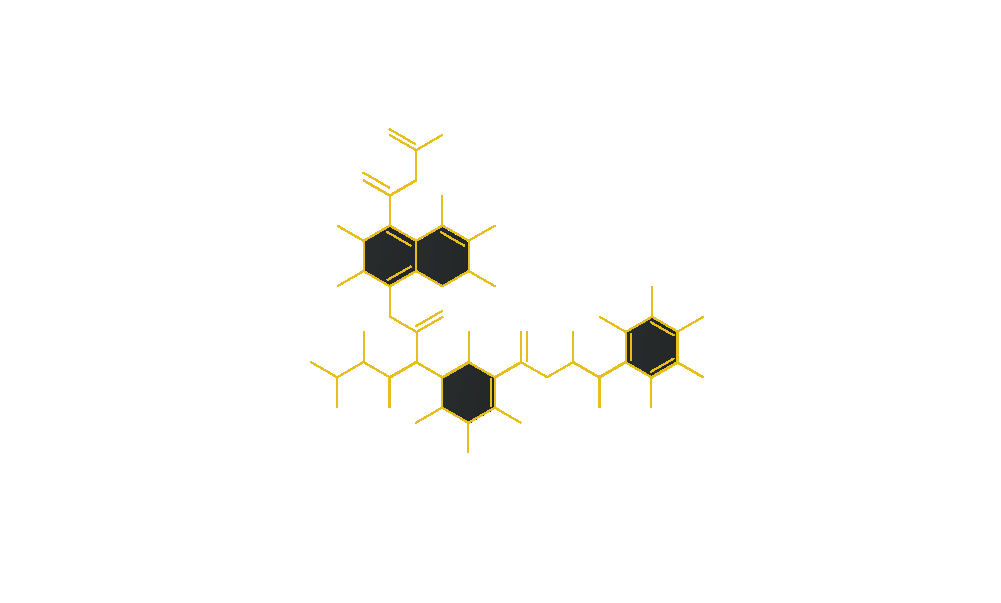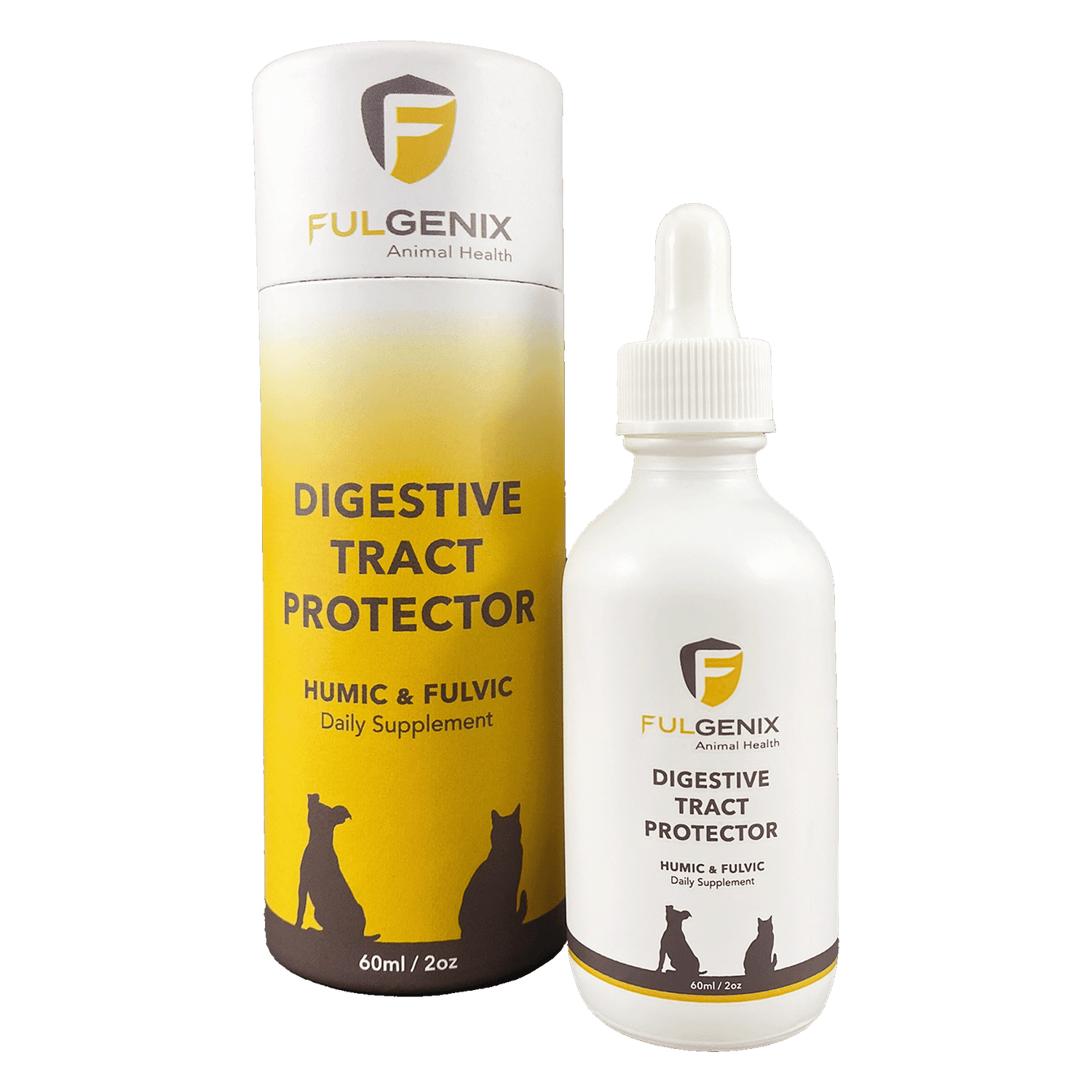In fact, life on earth would not
be possible without carbon.
Carbon’s ability to readily form bonds with other atoms is essential to the defining characteristics of life: growth and replication.
Carbon molecules are sought after by all organisms, which drives complex carbon cycles through all living systems.
What are humic and fulvic carbons?
Humic and fulvic acids are carbon-based molecules formed through the natural decomposition of organic matter.
They are known for their role in improving hydration, nutrient absorption, mineral delivery, heavy metal detoxification, immune function, and overall vitality in plants, animals, and humans.
We are all interconnected by carbon.

Humic acid.
Humic acid is an organic, negatively charged, carbon-rich molecule that supports microbial balance and chelation of heavy metals. It also helps maintain the integrity of the gut lining, preventing disorders in the digestive tract.

Fulvic acid.
Fulvic acid is a small but oxygen-rich, carbon-based molecule with a positive ionic charge that enhances the delivery of water and nutrients while aiding in cellular detoxification. It also acts as a potent antioxidant, neutralizing harmful free radicals, supporting immune function, and promoting overall cellular health.
Fulgenix is sourced from ancient soil deposits.
Fulgenix is made from humic and fulvic distilled from rock layers that were formed in eons past. We use a proprietary process to extract the molecules in their most pure liquid form, free to be reintroduced to the diets of our pets,
to help them live the way they used to.
Humic and fulvic acids have an enduring role in gut microbiomes.
What is a gut microbiome?
A microbiome is a complex community of microorganisms, including bacteria, fungi, viruses, and other microbes, that inhabit a particular environment.
In the context of animal health, the microbiome refers to the collection of microorganisms living on the skin and in the gut. These bacterial communities play a crucial role in maintaining health by aiding in digestion, synthesizing vitamins, and protecting against harmful pathogens.
-
Probiotics.
Probiotics are live microorganisms found in foods or supplements that are intended to maintain or improve the “good” bacteria in the body.
-
Prebiotics.
Prebiotics are foods (typically high-fiber foods) that act as food for gut microflora. They are essential to gut function and nutrition.

Fulgenix as a prebiotic source.
Activated carbons in Fulgenix Digestive Tract Protector offer a unique advantage for the microbiome by directly feeding beneficial gut microbes. Unlike traditional prebiotics that require fermentation, activated carbons bypass this step, providing faster and more efficient microbiome support and quicker digestive health benefits.

How humic and fulvic acids support gut health.
Nourish the microbiome.
Humic and fulvic acids help create an optimal environment for beneficial microbes in the gut to thrive. Acting as natural carbon sources, these compounds provide essential support for the gut microbiome. By promoting a balanced microbial ecosystem, they improve digestion, nutrient absorption, and overall gut health.
Protect the gut lining.
Humic and fulvic acids play an essential role in strengthening the gut lining. Humic acid binds to harmful toxins and heavy metals in the digestive tract, preventing their absorption and aiding in their safe removal. Fulvic acid helps reduce inflammation and supports the integrity of the gut barrier, protecting the mucous membranes and preventing issues like leaky gut. Together, they help maintain a robust and resilient digestive system.
Enhance nutrient absorption.
Fulvic acid acts as a natural nutrient transporter, helping essential vitamins and minerals cross cell membranes more efficiently. This ensures your pet absorbs more nutrients from their diet—whether raw, kibble, or wet food—maximizing the benefits of their meals. At the same time, humic acid works to detoxify the digestive tract by binding to unwanted substances, supporting both digestive efficiency and overall health.
-

Calm behaviour
Gut health is linked to mood. By nourishing the gut microbiome, these carbons may have a calming effect on the mind. Their mineral content also supports nervous system function.
-

Joint mobility
High in antioxidants, these compounds may help reduce occasional joint discomfort by supporting a healthy inflammatory response. Their mineral content also supports bone and joint health.
-

Energy levels
These natural substances provide an energy boost without stimulants. They help transport nutrients to cells for improved energy production.
-

Stool quality
Humic and fulvic acids contain active carbons that protect the gut lining in the bowel. This may help maintain regular, consistent bowel movements.
-

Skin health
These carbon-rich compounds contain antioxidants and nutrients that may help support skin health from within. Their detoxifying properties may help reduce occasional skin irritation.
-

Digestive comfort
Humic and fulvic acids are rich in prebiotics that nourish beneficial gut bacteria. They may help support a healthy gut microbiome for improved digestion and less occasional bloating.

Try Fulgenix.
Fulgenix Digestive Tract Protector is a foundational daily supplement that support the healthy functions of your pet’s gut microbiome.
It works in conjunction with the lifestyle, nutrition and hydration choices you make for your pet, and ensures they will absorb the nutrients they need from the other foods and supplements you feed to them.
Research and Citations.
Collapsible content
Gut health and microbiome
Impact of Humic Acids on the Colonic Microbiome in Healthy Volunteers
Oral supplementation with humic acids significantly increased the concentration of colonic microbiota over a 45-day period. Concentrations of 24 out of 35 substantial bacterial groups increased, suggesting humic acids have a profound positive effect on the healthy colonic microbiome.
Assessment of the Impact of Humic Acids on Intestinal Microbiota, Gut Integrity, Ileum Morphometry, and Cellular Immunity
Humic acid supplementation enhanced intestinal integrity, cellular immune response, and promoted a healthier gut microbiota composition. It improved gut health and immunity even under challenging dietary conditions, suggesting its potential as a dietary intervention for maintaining optimal gut function.
Effects of Fulvic Acids on Gut Barrier, Microbial Composition, Fecal Ammonia Excretion, and Growth Performance
Fulvic acid supplementation improved gut barrier function, altered microbial composition favorably, reduced fecal ammonia emission, and enhanced growth performance. These findings suggest fulvic acids may be an effective additive for improving gut health and overall performance.
Effects of Humic Acids on the Recovery of Different Bacterial Strains
Humic acids showed positive effects on beneficial gut bacteria while potentially inhibiting harmful strains. This suggests humic acids may act as a prebiotic, promoting a healthier gut microbiome balance.
Effects of Fulvic Acid on Growth Performance, Serum Index, Gut Microbiota, and Metabolites
Dietary supplementation with fulvic acid modulated gut microbiota by reducing potentially harmful bacteria and enriching beneficial strains. The study revealed changes in cecal metabolites, suggesting fulvic acid's positive impact on gut health and overall performance.
Nutrient absorption and metabolism
Effects of Fulvic Acid on Growth Performance, Serum Index, Gut Microbiota, and Metabolites
Dietary fulvic acid supplementation improved growth performance and immune function. It modulated gut microbiota by reducing potentially harmful bacteria and enriching beneficial strains. Changes in cecal metabolites suggest fulvic acid's positive impact on nutrient absorption and metabolism.
Effects of Fulvic Acid on Performance, Blood Biochemistry, and Intestinal Microflora
Fulvic acid supplementation enhanced growth performance, improved blood biochemical parameters, and beneficially altered intestinal microflora composition. These effects suggest improved nutrient utilization and metabolic health.
Humic Substances as a Feed Supplement and the Benefits Produced
Humic substances used as a feed supplement improved nutrient absorption, leading to enhanced growth performance and product quality. The research highlights potential benefits for both health and consumer product quality.
Effects of Fulvic Acid on Growth Performance and Intestinal Health
Fulvic acid supplementation improved growth rates and enhanced intestinal barrier function, suggesting better nutrient absorption and utilization. The study underscores fulvic acid's potential as a natural growth promoter and gut health enhancer.
Immune function and inflammation
Humic Acids Alleviate Aflatoxin B1-Induced Hepatic Injury by Reprogramming Gut Microbiota and Absorbing Toxin
Humic acids protected against toxin-induced liver damage by modulating gut microbiome composition and directly absorbing the toxin. They reduced liver inflammation, oxidative stress, and apoptosis while promoting beneficial gut bacteria, demonstrating their potential in liver protection and detoxification.
Therapeutic Potential of Fulvic Acid in Chronic Inflammatory Diseases and Diabetes
Fulvic acid showed anti-inflammatory and antioxidant properties, with potential benefits for chronic inflammatory conditions and diabetes. It modulated immune function, reduced oxidative stress, and improved insulin sensitivity, suggesting its therapeutic potential in managing various inflammatory disorders.
Fulvic Acid Attenuates Resistin-Induced Adhesion of HCT-116 Colorectal Cancer Cells to Endothelial Cells
Fulvic acid reduced the adhesion of colorectal cancer cells to endothelial cells induced by a pro-inflammatory adipokine. It suppressed inflammatory pathways and adhesion molecule expression, suggesting potential anti-metastatic effects and its role in cancer prevention.
Randomized, parallel-group, double-blind, controlled study to evaluate the efficacy and safety of carbohydrate-derived fulvic acid in topical treatment of eczema
Topical application of carbohydrate-derived fulvic acid was effective and safe in treating eczema. The fulvic acid formulation significantly improved eczema symptoms and skin hydration compared to placebo, with no serious adverse effects, indicating its potential in dermatological treatments.
Detoxification and heavy metal binding
Fulvic and humic acids decrease the absorption of cadmium
This study demonstrated that fulvic and humic acids significantly reduced cadmium absorption in intestines. The presence of these acids decreased cadmium absorption by approximately 50%. These findings suggest that fulvic and humic acids play a crucial role in mitigating cadmium toxicity by reducing its absorption and altering its distribution within cells.
Effect of humic and fulvic acid concentrations and ionic strength on copper and lead binding
This research examined how humic and fulvic acid concentrations and ionic strength influence copper and lead binding. Both acids effectively bound these heavy metals, with binding capacity increasing at higher acid concentrations. Ionic strength of the solution also affected binding, with higher ionic strength generally decreasing metal binding efficiency. The results indicate that humic and fulvic acids could be valuable for heavy metal remediation in various environmental conditions, offering a potential natural solution for metal contamination.
Neuroprotective and antioxidant effects
Fulvic acid inhibits aggregation and promotes disassembly of tau fibrils associated with Alzheimer's disease
Fulvic acid demonstrated the ability to inhibit tau protein aggregation into paired helical filaments (PHFs) and disassemble preformed PHFs in vitro. It affected the length and morphology of tau fibrils, likely acting at the hydrophobic level. These findings suggest fulvic acid's potential as a natural treatment for Alzheimer's disease by targeting tau aggregation, a key factor in the disease's progression.
The effect of fulvic acid on pre-and post aggregation state of Aβ(17-42): molecular dynamics simulation studies
This computational study used molecular dynamics simulations to investigate fulvic acid's effects on amyloid-β peptide aggregation. The research examined fulvic acid's interactions with Aβ(17-42) in both pre-aggregation and post-aggregation states. The study likely explored fulvic acid's potential to inhibit or disrupt amyloid-β aggregation, a process associated with Alzheimer's disease, suggesting its possible role in preventing or treating neurodegenerative disorders.
Safety and general health
A Comprehensive Toxicological Assessment of Fulvic Acid
This study conducted a thorough toxicological evaluation of fulvic acid to assess its safety for human consumption. The research examined various toxicity endpoints, including acute, sub-chronic, and chronic toxicity, as well as genotoxicity and reproductive toxicity. The comprehensive safety profile established supports fulvic acid's potential use as a nutraceutical or dietary supplement ingredient.
Nutraceutical--definition and introduction
This article provides context for understanding the potential classification of humic and fulvic acids as nutraceuticals. It proposes refined definitions for nutraceuticals, functional foods, and dietary supplements, which could apply to humic and fulvic acid products in the health market. The paper helps clarify the regulatory and functional positioning of these substances in the broader context of health-promoting compounds.
The Gut-Brain Axis: Influence of Microbiota on Mood and Mental Health
This study provides context for understanding how humic and fulvic acids might impact health through gut microbiome modulation. It explores the bidirectional communication between the gut microbiome and the brain, known as the gut-brain axis. Given that humic and fulvic acids can influence gut microbiota, this research suggests how such changes could potentially affect mood and mental health, broadening our understanding of these substances' potential health benefits.



